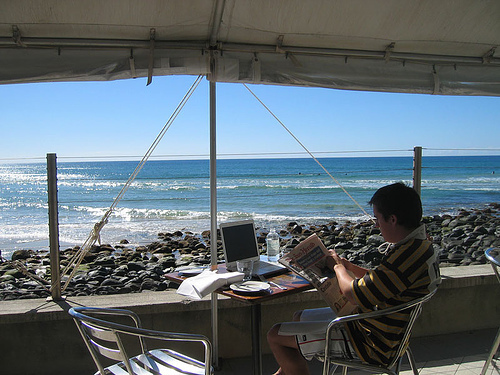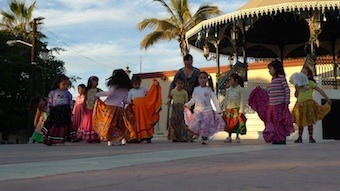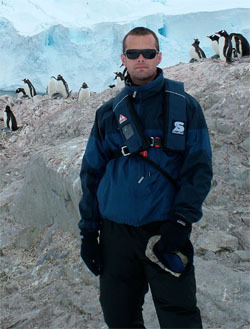Rolf Potts's Blog, page 134
March 4, 2011
WorkShifting: the blog for digital nomads

A blogger having breakfast on the Gold Coast with a laptop. Photo: Paull Young / Flickr
The Internet and web apps have freed a generation of people to work from anywhere they choose. This is a relatively new movement, so it's hard to find reliable information about telecommuting. Beyond technology, what about the other challenges? Some examples are loneliness, negotiating remote agreements with employers/clients, etc.
Enter WorkShifting. It's a blog dedicated to helping people with the ups and downs of working from anywhere. While not exclusively about travel per se, digital nomads will find many articles that are loaded with useful advice.
Interestingly enough, WorkShifting is actually a corporate blog. It's run by Citrix Systems, which provides networking and cloud computing tools. You'd never guess it from the site, since Citrix has been admirably restrained in promoting themselves. In addition, the blog is staffed by top bloggers and tech entrepreneurs, rather than just employees.
WorkShifting on Twitter is worth following. They find cool links from around the Web, instead of just trying to drive traffic back to the blog.
Are you a digital nomad? What websites and blogs do you follow? Please share in the comments.
March 3, 2011
Travel inspiration from TV
 I often find myself staring at Travel Channel programming, even when the show isn't very compelling to me. Sure, I'll tune in for Tony Bourdain's "No Reservations" any time, but sometimes I'll hang in for the clip shows of best beaches, just to get a look at turquoise water.
I often find myself staring at Travel Channel programming, even when the show isn't very compelling to me. Sure, I'll tune in for Tony Bourdain's "No Reservations" any time, but sometimes I'll hang in for the clip shows of best beaches, just to get a look at turquoise water.
It doesn't have to be the Travel Channel for me to get a glimpse of a place I'd like to visit. I used to watch "The Amazing Race" not for the competition, but for the views of cities around the world. A guilty pleasure show for me is "House Hunters International," so I can dream about where I could live if I pack up and leave the United States. In Granada, Nicaragua, I ran into a woman that I instantly recognized because she had been on an episode looking for a home in that town.
One show I just can't get into, even for the travel aspect, is "Survivor." After the first season, I burned out on all the obnoxious people. Even after spending some time recently on the Nicaraguan beach used for the recent "Survivor" season, I don't need to see how they used it for temporary housing. It looks far better without contestants and TV crews.
Do you get travel inspiration from TV shows? Which ones?
March 2, 2011
New budget travel options in Korea
 Those vagabonders funding their travels by working abroad in Korea, or those simply traveling through the country, will be happy to hear of Air Asia's new service to Korea. Korea has rested infuriatingly outside of the budget travel loop for quite some time. However, in November of last year, Air Asia began offering flights from Seoul to Kuala Lumpur for around US$300 round trip. This opens up a lot of options for travelers, as Kuala Lumpur is a major travel hub in Asia and it's easy to book cheap continuing flights to just about everywhere from there. Over the last few months the Air Asia service has grown to include flights from the Korean capital to Bali and Jakarta in Indonesia. Finally, leaving Korea no longer means dropping an easy $1,000. Get out there and start taking advantage of these deals!
Those vagabonders funding their travels by working abroad in Korea, or those simply traveling through the country, will be happy to hear of Air Asia's new service to Korea. Korea has rested infuriatingly outside of the budget travel loop for quite some time. However, in November of last year, Air Asia began offering flights from Seoul to Kuala Lumpur for around US$300 round trip. This opens up a lot of options for travelers, as Kuala Lumpur is a major travel hub in Asia and it's easy to book cheap continuing flights to just about everywhere from there. Over the last few months the Air Asia service has grown to include flights from the Korean capital to Bali and Jakarta in Indonesia. Finally, leaving Korea no longer means dropping an easy $1,000. Get out there and start taking advantage of these deals!
Vagabonding Case Study: Kyle Barraclough
Age: 40
Hometown: La Crescenta, CA
Quote: "The best part of long-term travel is the development of personal relationships."
How long were you on the road? On and off for 7 years and still counting…
Where all did you go? I visited every continent in my first trip around the world in 2004-05. Since then, I've broken some new ground, but I've mainly returned to places to develop relationships and projects I started the first time around.
What was your job or source of travel funding for this journey? Savings for the first few years.
Did you work or volunteer on the road? For the first few years, I didn't work. Since then, I've been working online. I started my own physical commodities trading company as well as a commercial representation service for a US manufacturer. Both involve international trade and can be conducted completely over the phone and internet, so I can stay mobile.
In 2005, I started helping a school in Yangon, Myanmar (Burma). In 2007, that relationship became an official charity. It's 100% volunteer and keeps me plenty busy.
Of all the places you visited, which was your favorite? The most fun was Buenos Aires. It is a cross between Paris and NYC at a 70% discount in prices and a 100% discount on attitude.
For me, the most beautiful city was Stockholm. I think that one day the travel books will discover what it is all about, name it the next hot destination and ruin it forever; so go now (PS-you heard it here first!).
For jaw-dropping beauty? Antarctica is unmatched. It is hard to describe the majesty of the place. It is perhaps the only place on Earth that man will never truly conquer; the elements are too powerful. As an unexpected contrast to the unforgiving moods of the elements, the inhabitants are surprisingly friendly. Penguins walk around you without fear as if on a busy New York sidewalk. The babies are known to sit on your lap if you're really still. Seals and sea elephants are completely unafraid and allow respectful observance.
If I were to move anywhere, I'd choose Cape Town. The vibrancy of the people and stunning location are irresistible.
The friendliest people were in Myanmar (Burma). They are also gentle, respectful, curious and energetic. In their company, as well as being in a place without the distractions of the modern world, I found my mind was able to rest as I had never before experienced.
Was there a place that was your least favorite, or most disappointing, or most challenging? I hate to answer this question – one of my pet peeves is travel books that say everything is fantastic! Then you take their advice and find out it is terrible! So, I'll say that Singapore is a place I don't have any desire to return to. I love all things Asian, but it seems Singapore has traded its original identity for something totally Western. It was built to be like everywhere, so it feels like being nowhere. If you ever go, you'll see what I mean.
Did any of your pre-trip worries or concerns come true? Did you run into any problems or obstacles that you hadn't anticipated? None. No lost baggage. No significant delays. Never robbed. I wasn't the subject of any major scam. In fact, I've never been victimized in any way. It was 3-4 years before I actually ate something that disagreed with me. I got sick from food more often in the US than on the road eating fresh food from street vendors.
Which travel gear proved most useful? Least useful? If you chase the sun, as I have, you can go around the world in flip-flops with a couple of grocery bags to carry personal items. I found that I didn't use most of my clothing or "things." I had a $300 backpack, but could have easily traveled with something smaller and less sophisticated. Of course, this doesn't apply if you are doing anything extreme. As for least useful, I would say my iPod and the 2,500 songs. I was so stimulated by the sights, sounds, smells and tastes of each place that I didn't need anything else to entertain myself. Not only that, but when I did use it, the iPod reduced my sensory experience. I could say the same for cell phones and laptops. Once you live without these items and realize you didn't miss anything by being "disconnected," they become distraction and prevent you from tuning into where you are and tuning out of where you were.
What are the rewards of the vagabonding lifestyle? You give yourself the time, space and silence to connect with the wisdom of the ages. Hopefully, vagabonding will take you to a place where you aren't so distracted by the meaningless aspects of life and let you experience some stillness. Once you tap into that, you see the universe is holding a mirror up to your face to show you who you are. From that point, evolution is inevitable.
Additionally, it seems so much easier to make friends. Everyone craves human connection and travelers are in a unique position to receive and extend a hand of friendship. Other travelers leave their tough exteriors at home and locals want to expand their world through you. The best part of long-term travel is the development of personal relationships.
What are the challenges and sacrifices of the vagabonding lifestyle? For me, the biggest challenge is resisting the great homogenizing voice of the world. By going against the grain of society, family, etc., one has to develop confidence and faith in the path being forged. Otherwise, you will constantly question your choices and possibly end up back where you started.
What will you sacrifice? Get in your car and drive through the nearest suburb. Perhaps, your suburb. Look around. Does that seem like a sacrifice?
What lessons did you learn on the road? I had it right as a child.
How did your personal definition of "vagabonding" develop over the course of the trip? I learned it existed. In the beginning, I thought would have to one day return to my old life after the adventure was over. Happily, I discovered that wasn't the truth at all.
If there was one thing you could have told yourself before the trip, what would it be? Nobody actually gives a damn who/what you are, so just be/do what you want, unapologetically.
Any advice or tips for someone hoping to embark on a similar adventure? Start now. The conditions you are hoping to exist to make it easy for you to start, may or may not come. You don't have the control over those things that you think you do. If the stars align and light an easy path to the airport, congratulations. But, normally in life, difficult situations resolve only to be replaced by new challenges which turn into new excuses. It will never be easier than it is at this moment. Waiting is pointless in a world of constant change where security and stability are temporary (and, therefore, aren't actually secure and stable).
When and where do you think you'll take your next long-term journey? I'm on it and don't expect it to end. Asia now, S. America by the end of the year.
Twitter: equalfooting
Website: www.equalfooting.org
Are you a Vagabonding reader planning, in the middle of, or returning from a journey? Would you like your travel blog or website to be featured on Vagabonding Case Studies? If so, drop us a line at casestudies@vagabonding.net and tell us a little about yourself.
March 1, 2011
Travel now to Egypt
Cairo, Egypt
"Right now Egypt is like having a fast pass at Disney. People should come over."
These are the words of Rick Zeolla, the general manager of the Cairo Marriott, quoted last week in a New York Times article titled "Tahrir Square, Egypt's New Tourist Draw." In that same article, the general manager of the Semiramis InterContinental said that his guest today are asking for rooms with a view of Tahrir Square rather than the Nile. "The early guests we are seeing are more independent, well seasoned and globally focused travelers," he said.
There is indeed a strong case to be made, on several fronts, that now is the time to visit Egypt. True, lines are currently non-existent at tourist sites. But the stronger argument, I think, is that what is going on now in Egypt — i.e., a transition from autocratic rule to what the majority of Egyptians hope will be democracy — is no less stunning to behold than the gazillion blocks of stone that form the Pyramids of Giza or any number of other ancient monuments in this land. I visited the Pyramids last week and they were nice. But it was even more fascinating to sit in Saad Zaghloul Square in Alexandria, or Tahrir Square in Cairo (above), and watch teenagers, Muslim and Christian together, give railings and curbs a fresh coat of paint. To be sure, they often did a lackluster paint job. But I wasn't focused on their painting skills. I was focused on the spirit with which they painted and worked together, on the dreams they had for their country and communities.
Seldom will you be encouraged to visit a country to watch people paint curbs and pick up trash. But if you're a reader wondering where to go in 2011, I'm doing precisely that. Come to Egypt to watch mediocre paint jobs. Come to watch Egyptians, who often meet and coordinate through Facebook pages, as they pick up trash from sidewalks. Talk with them. Watch their faces and laughter and eyes. Listen to what they have to tell you about pride and freedom and service. In saying this, I'm not romanticizing the challenges Egypt face — they're pretty darn huge. I'm just saying that something remarkable is happening here, particularly with many young people.
Some travel warnings will encourage you to stay away a while longer, and many brochures will only suggest the ancient monuments. But consider coming anyway, and coming primarily to meet and watch Egypt's vibrant, beaming youth in the city centers. They'll tell you Egypt isn't just ancient ruins; it's a place still under construction.
For a beautiful video welcoming visitors back to Egypt, check out "From Egypt with Love".
For more of my images from Egypt in February, including the demonstrations and celebrations, visit my Flickr set called Cairo, Egypt (2011).
Moving through life with 6 "I"s
I've recently started reading this book called "Life is a Verb", by Patti Digh, and aside from having a lot of stories about small children in it (as an unrepentant non-child-haver, I sometimes get a little fed up with how precious everyone is supposed to think children are, all the time), it has some truly good advice for everyone, but particularly for those of us who make the world our home. Obviously, anyone can live in the world, but vagabonders…we live everywhere. We live out loud, traveling as we go, and sometimes we might need some guidance, or feel squashed, and then the paths we can follow back to the world at large can be hard to find.
This book has a simple group of 6 "I"s that lead you to wherever you want to go. As follows:
Intensity: Say yes
Inclusion: Be generous
Integrity: Speak up
Intimacy: Love more
Intuition: Trust yourself
Intention: Slow down
Sounds like pretty good advice to me. As a final addition, a quote in the book resonated with my theories of long-term travel, a quote by Carl Rogers: "The good life is a process, not a state of being. It is a direction, not a destination." The journey of a thousand years begins with a single step.
February 28, 2011
True education is about awareness, not knowledge
"The capital-T Truth is about life before death. It is about the real value of a real education, which has almost nothing to do with knowledge, and everything to do with simple awareness; awareness of what is so real and essential, so hidden in plain sight all around us."
David Foster Wallace, Kenyon College commencement speech, May 21, 2005
February 25, 2011
What does it take to be a frugal traveler?

A urinal in Yangon, Myanmar (Burma). Photo: Marcus Sortijas
Travel writers have it easy. They get to see the world, express their creativity through storytelling, have adventures–and their company pays for it all! How sweet is that?
Seth Kugel, the current writer of The New York Times "Frugal Traveler" column, bursts that bubble in his article, How to be a frugal traveler. He answers the most frequent question he gets: "How can I get your job?" Kugel says the more relevant question would be, "Are you sure you could handle my job?"
Kugel then runs down a list of the common compromises that are familiar to vagabonders: sometimes dodgy accommodations, "traditional" bathroom setups like squat toilets, and privacy concerns if you stay in hostel dorm rooms.
This is the kind of piece I'd love to show to friends and family who assume travel is all effortless leisure. We've all dealt with how some people think our trips consist of sipping piña coladas by the beach every day. Travel is work, whether you're a travel writer or not.
Roberto Rocha, one of the writers of the terrific Mojotrotters blog, had this example of hitting rock-bottom as a frugal traveler: What a $5 hotel in India looks like. I think we've all faced that problem at some point. You've arrived in town too late. You're too tired to keep looking at more rooms. And the alternatives are too expensive. So you take the crappy room and hope you wake up alive the next morning.
Have you got any horror stories from your adventures as a frugal traveler? Please share them in the comments.
February 24, 2011
Serendipitous discovery
 Over-organizing travel plans—where you're in a different place each day due to a long checklist of things to see—can actually result in seeing less. Sure, you may get to all the monuments or museums you want, but while the checklist blinders are on, you could be missing out on a lot of local culture.
Over-organizing travel plans—where you're in a different place each day due to a long checklist of things to see—can actually result in seeing less. Sure, you may get to all the monuments or museums you want, but while the checklist blinders are on, you could be missing out on a lot of local culture.
Recently, I was in the town of Todos Santos, in Mexico's Baja California Sur. In between the must-sees, I took the time to wander around and get a feel for the area—set in an oasis on the Pacific Ocean. I assumed I'd run into a bunch of artisan shops, some street color and a pretty plaza.
At one point, I turned a corner and found a group of young girls in folklórico skirts on a stage in the plaza, rehearsing for an upcoming performance. Some of them were paying attention to the instructor, some looked like they didn't want to be there, and the rest were distracted by my paparazzi actions and posed for the camera. They went through their moves, often reprimanded by their instructor—but time stood still. It was a moment of serendipitous discovery.
Had I been focused on seeing certain things on a timetable, I might have missed this moment. But even if you don't run across something quite so dramatic on your travels, keeping your mind clear of expectations and a strict schedule can often open your eyes to things you'd otherwise miss.
I was a guest of the Mexico Tourism Bureau during my time in Baja California Sur.
February 23, 2011
Rice Wine
 Rice wine is a fairly popular staple of Asia. Its popularity, over history, has spread its way West and become a common enough spirit there. Rice wine doesn't share the same fermentation process as fruit based wines, but rather undergoes a brewing method quite similar to beer. As with the brewing of beers, first the starch from the rice is processed into sugar, and then the sugar is used to produce the alcohol. Though with rice wines, these steps can occur simultaneously.
Rice wine is a fairly popular staple of Asia. Its popularity, over history, has spread its way West and become a common enough spirit there. Rice wine doesn't share the same fermentation process as fruit based wines, but rather undergoes a brewing method quite similar to beer. As with the brewing of beers, first the starch from the rice is processed into sugar, and then the sugar is used to produce the alcohol. Though with rice wines, these steps can occur simultaneously.
The most popular rice wine in the West is undoubtedly Japan's sake. Sake is a clear rice wine that is served hot in the winter and cold in the summer. Most commonly sake is drank from tiny ceramic cups about the size of an espresso mug, and poured from a small ceramic flask. Sake can carry fruit and sour notes, and often carries a bit of a bight.
In Korea, the king of rice wine is makkoli. Makkoli is a sweet, milky rice and wheat based wine. Its texture and flavour are much milder than rice wines like sake. Makkoli is commonly served from a large metal kettle or bowl, and is poured or ladled out into smaller bowl-like cups to drink. As makkoli is most commonly served cold, the large kettle or bowl usually rests atop a bin of ice between pours.
Makkoli is available in virtually every eatery in Korea and can also be purchased in bottles from the local market or corner store – give it a good shake before opening. However, if you're lucky enough to know someone who makes his or her own makkoli, this is certainly preferable. Well-brewed makkoli should carry a fine fizziness to it, rather similar to champagne.
These two wines are popular traditions that have made their way West. However, most Asian countries have myriad variations of rice wines and accompanying serving methods to offer. Among other places, one can also find rice wines in Vietnam, China, Tibet, India, and Indonesia.
(image credit: travelblog.net)
Rolf Potts's Blog
- Rolf Potts's profile
- 323 followers





